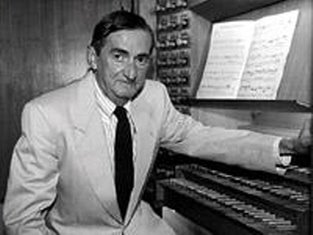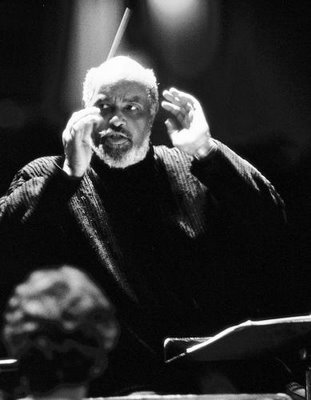Classical Travels with Paul E. RobinsonTHIS WEEK IN TEXAS

I went to the Met HD Live at the new Cinemark complex in
Cedar Park, one of
Austin’s northern suburbs. Only ten people showed up for
John Adam’s
Dr. Atomic. Perhaps not surprising for a contemporary piece with no big names in the cast, but cause for concern about the future of this project. More about that later.
Timely Topic: A World in Crisis & the Question of Morality
Whatever else one may say about the
Dr. Atomic it served the admirable purpose of reminding us that we live under the shadow of the
atom bomb and that nuclear annihilation is only an irrational finger on the trigger away. Adams’ opera deals with the first test firing of the bomb in Los Alamos, New Mexico July 16, 1945.
J. Robert Oppenheimer was the director of the Manhattan Project which developed the bomb and his anguish about the morality of the project is the focus of the opera. The leading characters in addition to Oppenheimer are his wife Kitty, their American Indian maid Pasqualita and another scientist even more troubled than Oppenheimer, Edward Teller.
But while the subject matter is very timely – concern continues to rise all over the world about possible development of nuclear weapons in Iran, the sanity of Kim Jong Il in North Korea and the shaky political situation in Pakistan – I am not convinced that Adams and his librettist Peter Sellars made the right choices. To bring to life the tragic figure Oppenheimer really was it is necessary to follow his life after the development of the atom bomb. That’s when doubt and remorse set in and his behavior and questionable past even led Washington politicians to destroy his reputation. He died essentially a broken man. There is plenty of evidence that Oppenheimer associated with members of the communist Party. What’s more both his wife and brother were members. Nonetheless, Oppenheimer was chosen to head up the most sensitive wartime program involving national security. In
Dr. Atomic we get only a partial view of the man and not enough of him to carry the opera.
Dr. Atomic? Not Enough of Oppenheimer’s Life in this Opera!Looking at the story from another point of view, it could be argued that it is hardly fair to blame Oppenheimer and his colleagues for the development of the bomb and for the
horrors that followed when bombs were dropped on Hiroshima and Nagasaki. Adams and Sellars clearly take sides in this matter by using the Los Alamos badge photos of all the scientists involved as the equivalent of police mug shots to vilify them. But the scientists involved in the Manhattan Project were basically ordered by the President and the Congress to develop an atom bomb and to do it as quickly as possible. If anyone is to blame for the bomb and how it was used, it is the politicians from Truman on down. And yet there is not a single politician in the opera, nor does anyone seem to be in contact with one. Very strange.
Natural Bedmates: Politics & War Conceive Atom Bomb!What was the motivation for the development of the bomb? Why did they do it? After the Nazis had been defeated in Europe early in 1945, the world turned its attention to defeating the Japanese. But this war was much more uncertain and most politicians believed that it could drag on for years and that many more people would lose their lives. If it could be ended quickly many of those lives would be saved; hence, the haste to develop the bomb. This issue is hardly touched on in the opera. Instead, the opera focuses on the creation and use of atomic weapons as a difficult moral issue. But to my mind, whether that can be done without touching on war strategy or the role of the politicians is doubtful.
Operatic Style, the Meaning of it all, and Some Inspired new Arias
Dr. Atomic is not primarily a political or philosophical treatise or even a documentary; it is a work of art. Adams and
Sellars draw on diaries kept by some of the participants but they rely more on poetry by Donne, Beaudelaire and Muriel Rukeyser as well as lines from the Hindu epic the
Bhagavad Gita.
In operatic terms much of the discussion between characters onstage is on the level of everyday speech, recitative-style, but when the characters are alone they tend to be given extended arias with poetic texts. With this procedure Adams takes the “story” out of place and time into a more abstract and universal milieu. The characters are seen ruminating not about the tactical use of nuclear weapons to win the war nor even about the use of nuclear weapons generally but about the meaning of it all, the ultimate philosophical questions.
Fair enough. Development of weapons capable of wiping out civilization as we know it easily gives rise to such questions. But from an artistic point of view, what does the borrowing of lines from Donne, etc. do for the success of the opera? The answer is a great deal in some instances. Adams’ setting of Donne’s sonnet “Batter my heart, three person’d God” at the end of Act I is surely one of the great set pieces written by any composer in the past twenty years. But elsewhere, especially in Kitty Oppenheimer’s “arias” I felt that the composer had lost his way.
Full Effect of Atom Bomb’s Aftermath Diminished by Artistic ChoiceIt is surely a major fault of the opera that nearly the whole of Act II seems to be about the weather. Characters talk endlessly about the storm interfering with the test. It is obviously getting on their nerves. And ours too. In an opera about big ideas – very big ideas – it makes no sense to spend so much time discussing the weather.
But am I missing the point? Surely the weather is a metaphor for the war, the troubled minds of the scientists and the military men, etc. It is also a device to build tension. Early on opera composers learned that there is nothing like thunder and lightning on stage to bedazzle the public. It is such an old and hoary device one is amazed that a composer as experienced as Adams would be caught using it.
To my mind we can only let Adams get away with it if there is a real payoff. In this case, it has to be the test itself, the explosion of the first atom bomb, immortalized in
film footage we have all seen over and over. But the site of that monstrous mushroom cloud surely remains as frightening as it was the first time we saw it. But wait. This iconic image is not used in the opera. We don’t even get a blinding flash of light. Instead, while Oppenheimer and his colleagues wearing goggles and other protective gear stare out at the audience/test site we get words being spoken in Japanese, presumably by some of the victims of Hiroshima and Nagasaki, and we see projected translations. The connection is made between what Oppenheimer and his team created at Los Alamos and how it was used. We are left to ponder the
Faustian connection between ultimate knowledge and soul-selling.
But as I mentioned earlier, Oppenheimer and his work had a context in which his country was engaged in a life and death struggle, and in which many Americans in elective office were agonizing over the use of nuclear weapons. And if one chooses to concentrate on the role of one man – J. Robert Oppenheimer – in this project, we need a far more comprehensive picture of the man than Adams and Sellars provide.
Fine Voices, Good Conducting, and More Technical Problems
For the record, Canadian baritone
Gerald Finley sang very well indeed as Oppenheimer and
Alan Gilbert making his Met debut was in total command of the complex score. The young American conductor takes over next season as music director of the
New York Philharmonic.Technical problems continue to be an issue at these Met broadcasts. In two different theaters I have had to go in search of a technician to turn up the volume, on another occasion to turn down the house lights, and on yet another to reset the satellite receiver when the broadcast was interrupted. The problem is that in multiplex theaters there is no projectionist in each theater so there is no one on site to rectify problems. And in spite of all the hoopla about surround sound in these theaters the audio quality for the Met broadcasts is awful. Voices come across quite well but the orchestral sound lacks weight and depth. EMI is now releasing some of the Met broadcasts from last season. I will be interested to hear if these DVDs provide better sound than we heard in the theaters.
A ‘Good Thing’, But Will it Last?The Met HD Live project is a wonderful innovation but it is not where it needs to be if it is going to be of lasting artistic value. It worries me that so few people were in the theater for
Dr. Atomic. I heard that at a repeat showing of
Salome at one of the Austin theaters – with
Karita Mattila giving a performance of staggering quality – hardly anyone showed up. The technical problems need to be addressed but much more needs to be done on the marketing side too. When the novelty wears off – and that appears to be starting to happen – there is work to be done at the local level to raise awareness and interest. In my experience, there is no signage for Met HD Live showings in the theaters themselves, let alone any local advertising. That is a recipe for disaster down the road.
Paul E. Robinson is the author of
Herbert von Karajan: the Maestro as Superstar and
Sir Georg Solti: his Life and Music, both available at
http://www.amazon.com/. For more about Paul E. Robinson please visit his website at
http://www.theartoftheconductor.com/. Labels: Austin Lyric Opera, Dr. Atomic, John Adams, Met in HD, Metropolitan Opera, Texas, travel





